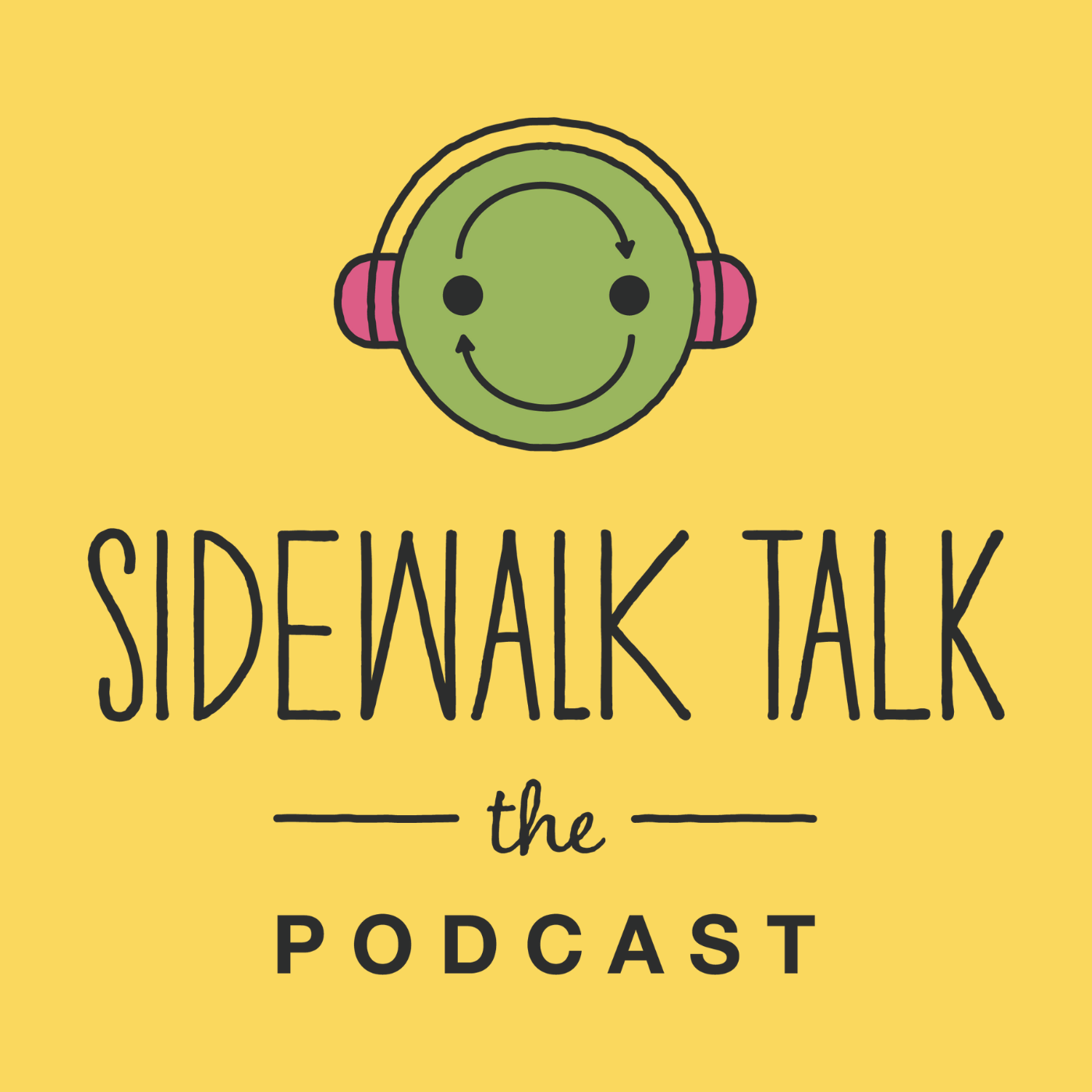
In a world that loves to talk, do, achieve, promote, preach, sell....what does it mean to connect, be, and listen. A podcast about #humanconnection #mentalhealth #socialhealth #empathy #belonging and #loneliness. And always thinking about justice and inclusion in all things. Join us. And share far and wide. Or start your own chapter of Sidewalk Talk in your community. www.sidewalk-talk.org
In a world that loves to talk, do, achieve, promote, preach, sell....what does it mean to connect, be, and listen. A podcast about #humanconnection #mentalhealth #socialhealth #empathy #belonging and #loneliness. And always thinking about justice and inclusion in all things. Join us. And share far and wide. Or start your own chapter of Sidewalk Talk in your community. www.sidewalk-talk.org
Episodes
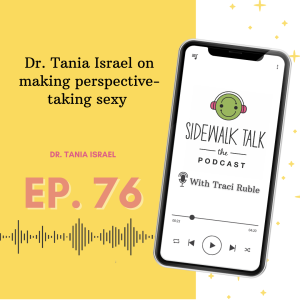
Tuesday Jul 27, 2021
Dr. Tania Israel on making perspective-taking sexy | Dr. Tania Israel
Tuesday Jul 27, 2021
Tuesday Jul 27, 2021
Author and professor Dr. Tania Israel wants to make perspective-taking sexy again. Her book, Beyond Your Bubble, is all about reaching beyond our differences to find where even the most vehemently opposed, politically and otherwise, can find common ground. On this episode of The Sidewalk Talk podcast, Traci talks with Tania about why conversations about political differences are so challenging right now, the concept of intellectual humility, and the skill and attitude we need to cultivate as a society in order to grow (hint: it’s listening and curiosity).
Dialoging about our differing political opinions can be so difficult right now, especially in an age where social media and 140-character tweets are the norm. Tania wants to help us move away from moral posturing and towards a place where we actually sit down and have a nuanced conversation with someone, whether they believe what we do or not. It’s not an easy task, but it’s one Tania, and so many like her, are willing to embark upon. Don’t miss this timely episode!
Episode Milestones
[00:07] Intro
[02:50] Meet Dr. Tania Israel
[06:51] Why conversations about political differences are so challenging
[10:03] Moral posturing and politics
[13:07] Social media’s ability to polarize
[16:38] Lifting up the voices of those in the middle
[20:44] What compelled Tania to write Beyond Your Bubble
[24:49] The skill and attitude we need to work on as a society
[28:00] Traci’s examples of dialoguing across political lines
[30:57] Dialoging about differences on social media
[33:29] The Heineken ad and bringing people together
[35:43] How to find Tania’s work
[36:55] Tania’s word for you
[38:41] Outro
Resources Mentioned
Beyond Your Bubble: How to Connect Across the Political Divide
The Flowchart That Will Resolve All Political Conflict In Our Country
Standout Quotes from the Episode
“It’s not just about a policy—it’s about taking a position about people who are on the other side of that policy, and I think that’s what’s actually creating so much damage right now.”
—Dr. Tania Israel
“It feels like the standards are very narrow in terms of the ways we can prove what our values really are.”
—Dr. Tania Israel
“People don’t necessarily like and retweet someone who says, ‘yeah, I can see both sides of that.’”
—Dr. Tania Israel
“We need to make perspective-taking sexy.”
—Dr. Tania Israel
“I can’t try to understand somebody else through my lens, I have to try to get what their lens is, and then I can see it.”
—Dr. Tania Israel
“We need to actually want to understand before we’re motivated to actually apply listening skills.”
—Dr. Tania Israel
“The more types of input we have about somebody, then the easier it is to understand their perspective.”
—Dr. Tania Israel
“Keep investing in other people—we need each other, and we can hold each other and knit ourselves back together.”
—Dr. Tania Israel
Connect:
Find | Sidewalk Talk Podcast
On Instagram: @sidewalktalkorg
On Twitter: @sidewalktalkorg
Find | Traci Ruble
On Instagram: @TraciRubleMFT
On Twitter: @TraciRubleMFT
On Facebook: @TraciRubleMFT
Find | Tania-Israel
On Twitter: @Tania_Israel
SUBSCRIBE TO THIS PODCAST
On Spotify
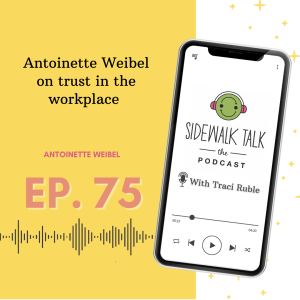
Tuesday Jul 20, 2021
Antoinette Weibel on trust in the workplace | Antoinette Weibel
Tuesday Jul 20, 2021
Tuesday Jul 20, 2021
Antoinette Weibel thinks trust rocks! As a researcher and professor at the University of St. Gallen in Switzerland, Antoinette has devoted much of her life to the study of trust, specifically in the workplace. Traci cold-called Antoinette, and what resulted is a multifaceted and fascinating conversation on trust, vulnerability, and why trust has eroded in society and at work over the past 25 years.
On this episode of The Sidewalk Talk podcast, Traci gets the chance to ask Antoinette all about her research on trust and how trust, or a lack thereof, colors us both as employees and leaders. Together, the two explore trust within organizations, employee engagement and wellness, and what Antoinette hopes will shift in the future when it comes to trust in the workplace. Their conversation wraps up with Antoinette sharing her top three ways to cultivate trust: taking an interest in your employees, listening to those employees, and then finding things to appreciate about them. Trust is such an important topic in our organizations and society at large right now—don’t miss this compelling conversation!
Episode Milestones
[00:07] Intro
[02:52] Meet Antoinette
[04:18] What Antoinette has learned about trust
[11:45] The chipping away of trust in society
[13:49] Antoinette’s definition of trust
[15:05] Trust within organizations
[19:37] Employee engagement and wellness
[24:07] The principles of trust Antoinette sees in her own life and career
[26:59] Vulnerability and gender roles
[33:29] What Antoinette hopes shifts in the workplace
[35:29] The top 3 ways to cultivate trust
[36:40] Antoinette’s word to you
[37:42] Outro
Resources Mentioned
Standout Quotes from the Episode
“It’s good to start with a bias towards trust.”
—Antoinette Weibel
“I’m really daring something because I believe in you.”
—Antoinette Weibel
“We’re not looking so much for the brilliant minds that can tell us what the future looks like, but we are now at present looking more for people who have a passion for other people, who maybe love their employees to a certain degree, and who are showing integrity.”
—Antoinette Weibel
“A good leader can make all the difference.”
—Antoinette Weibel
“Learning in itself is not the problem—it’s to let go a little bit of control.”
—Antoinette Weibel
“I think it’s essential for building trust that you’re also able to listen.”
—Antoinette Weibel
“Who has given us the right to create suffering machines?”
—Antoinette Weibel
Connect:
Find | Sidewalk Talk Podcast
On Instagram: @sidewalktalkorg
On Twitter: @sidewalktalkorg
Find | Traci Ruble
On Instagram: @TraciRubleMFT
On Twitter: @TraciRubleMFT
On Facebook: @TraciRubleMFT
Find | Antoinette Weibel
On LinkedIn: @AntoinetteWeibel
On Twitter: @antoinetteprof
On Facebook: @Weibelcrew
SUBSCRIBE TO THIS PODCAST
On Spotify
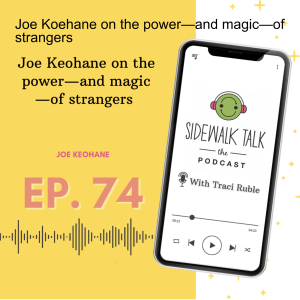
Tuesday Jul 13, 2021
Joe Koehane on the power—and magic—of strangers
Tuesday Jul 13, 2021
Tuesday Jul 13, 2021
Joe Keohane has been meeting strangers for decades. As an accomplished journalist and editor, Joe has made a career out of listening to people he doesn’t know and engaging with their stories. But as the world reemerges from the COVID-19 pandemic, loneliness is on the rise, and strangers feel more strange than maybe ever before. Is there still something to be gained from expanding our social circles and interacting with strangers after 18 months of isolation? Joe sure thinks so.
On this episode of The Sidewalk Talk podcast, Traci sits down with Joe to talk about his brand new book, The Power of Strangers. Together the two talk about the impact listening to strangers has on us, the magic of meeting someone new, and how to cultivate a healthy curiosity towards others in an effort to combat loneliness. There may never be a more perfect time for this conversation as we relearn how to connect with those around us.
Episode Timeline:
[00:07] Intro
[02:43] Meet Joe
[07:39] Why Joe wrote The Power of Strangers
[16:40] The impact listening to strangers has on us
[21:55] The magic of meeting strangers
[27:20] What surprised Joe in his research
[36:18] Loneliness after the pandemic
[42:49] Traci and Joe’s hospitality stories
[47:03] Joe’s word for you
[49:45] Outro
Resources Mentioned:
The Power of Strangers: The benefits of connecting in a suspicious world
Standout Quotes:
“It really doesn’t take that much for people to feel comfortable with you. It’s not that hard for a total stranger to be like, ‘oh yeah, we can get along!’ just because of this piece of fabric on my head.”
—Joe Keohane
“In a way, every time you speak to a stranger, if you learn to do it well, you get a little glimpse of what the life of another person is like, and that’s huge.”
—Joe Keohane
“It becomes very difficult to dismiss a group of people when you’ve had good engagements with members of that group.”
—Joe Keohane
“There’s a lot in a person, and when you talk to them you get to travel to that little universe, you get to interact with it.”
—Joe Keohane
“One of the more curious things about humans is that we are neophobic and neophiliac at the same time—we’re afraid of new things, but we love new things.”
—Joe Keohane
“It’s in our benefit to grow our social networks, to have friends.”
—Joe Keohane
“The opportunity that COVID presents us with is it took us very quickly to the conclusion that we were slowly moving towards anyways, which was 300 million individuals alone in rooms looking at screens.”
—Joe Keohane
“Almost every crisis we’re facing right now is a crisis of belonging.”
—Joe Keohane
Connect:
Find | Sidewalk Talk Podcast
On Instagram: @sidewalktalkorg
On Twitter: @sidewalktalkorg
Find | Traci Ruble
On Instagram: @TraciRubleMFT
On Twitter: @TraciRubleMFT
On Facebook: @TraciRubleMFT
Find | Joe Keohane
On Twitter: @JoeKeohane
On LinkedIn: @JoeKeohane
SUBSCRIBE TO THIS PODCAST
On Spotify
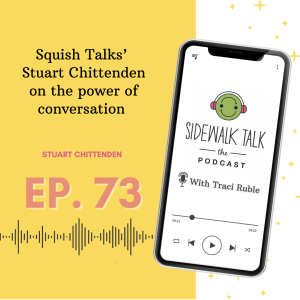
Tuesday Jun 15, 2021
Squish Talks’ Stuart Chittenden on the power of conversation | Stuart Chittenden
Tuesday Jun 15, 2021
Tuesday Jun 15, 2021
Stuart Chittenden is a highly interesting character. A lawyer by trade, he moved to Omaha, Nebraska from England after marrying his wife and grew fascinated by the inherent power of conversation. That fascination led him to start Squish Talks—the organization he has leveraged to unlock human potential in all areas of society simply through conversation.
On this episode of The Sidewalk Talk podcast, Traci laughs, learns, and grows from her conversation with Stuart as they converse about all things politics, crying, crying about politics, the movie “Inside Out,” and their plans for a COVID coming out party. As many questions as Traci asks him, Stuart asks them right back to her, and what results is an engaging back and forth about Squish Talks and Sidewalk Talk and how these two individuals are using their platforms to create a world built on connection.
Episode Milestones
[00:07] Intro
[02:34] Meet Stuart
[07:02] Stuart asks Traci why she started Sidewalk Talk
[07:58] The heart behind Squish Talks and Sidewalk Talk
[12:40] Stuart’s travels around Nebraska and what it taught him
[14:53] Crying after the last presidential election and Stuart’s feelings now
[18:03] How Stuart recovered from the election and regained his belief in conversation
[23:34] Practices and experiences to carry forward post-COVID
[26:48] Coming out of COVID party
[30:27] How Stuart finds ways to engage in dialogue politically
[36:22] Listening, silence, and humor as components of dialogue
[41:11] What’s next for Stuart
[44:17] Outro
Resources Mentioned
Standout Quotes from the Episode
“Conversation does have the power to connect people, but it also affirmed my sense that people have a desperate, and deep, and profound yearning to be seen by other people.”
—Stuart Chittenden
“A conversation is never meant to share a truth with someone else. It’s meant to share your truth and to help someone else, too. It’s not about correcting something; it’s about connecting something.”
—Stuart Chittenden
“I don’t need to know at this point which way did you vote, I just need to know that as a human being you’re awed by the majesty of this.”
—Stuart Chittenden
“Unless I’m in-person with someone, I’ve found it’s pointless to engage in politics with someone.”
—Stuart Chittenden
“I’m struggling to let my own beliefs go or stop them getting in the way of listening to someone else. And that’s work that I need to keep doing.”
—Stuart Chittenden
“I don’t think we ask enough genuine, authentic, I-want-to-hear-your-answer kinds of questions of other people, of the world, of ourselves.”
—Stuart Chittenden
Connect:
Find | Sidewalk Talk Podcast
On Instagram: @sidewalktalkorg
On Twitter: @sidewalktalkorg
Find | Traci Ruble
On Instagram: @TraciRubleMFT
On Twitter: @TraciRubleMFT
On Facebook: @TraciRubleMFT
Find | Stuart Chittenden
On LinkedIn: @StuartChittenden
On Instagram: @squishtalks
On Twitter: @SquishTalks
On Facebook: @SquishTalks
SUBSCRIBE TO THIS PODCAST
On Spotify
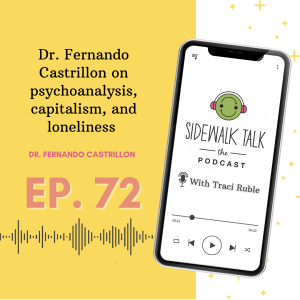
Tuesday Jun 08, 2021
Tuesday Jun 08, 2021
Psychoanalysis has long been thought of as outdated, misogynistic, and even racist—a type of therapy for the rich and privileged. In fact, Dr. Fernando Castrillon thought as much himself when he first encountered psychoanalysis, but has since changed his mind, and is working to change the minds of others through his work and words on the subject.
On this episode of The Sidewalk Talk podcast, Traci talks with Dr. Fernando on all things psychoanalysis, how it differs from more typical forms of therapy practiced in the West, and how a psychoanalyst would address our society’s loneliness epidemic. During their conversation, Traci even shares her anger at psychotherapy with Dr. Fernando, inviting him to respond, and maybe even change listeners’ viewpoints on this practice that started with the likes of Freud and Lacan. The episode ends with Dr. Fernando’s word for you, the Sidewalk Talk listener, reiterating that psychoanalysis is, at its heart, an unlearning that makes room for another person to bring themself forward.
Episode Milestones
[00:07] Intro
[03:46] Meet Dr. Fernando
[08:56] Overview of psychoanalysis and the California Dream
[16:03] Psychoanalysis versus more “typical” therapy approaches
[20:31] What Lacan would say about Sidewalk Talk
[27:54] Output and a lack of receptivity in our culture
[32:23] Traci’s anger at psychotherapy and Dr. Fernando’s response
[36:50] The psychoanalysis of our society’s loneliness epidemic
[44:44] Dr. Fernando’s word for you
[47:12] Outro
Resources Mentioned
European Journal of Psychoanalysis
California Institute of Integral Studies
Standout Quotes from the Episode
“My job then is to sit there and listen to what might arise from this place of lack, as opposed to somehow nullifying it by trying to fill it in with something. That runs directly counter to the discourse of capitalism.”
—Dr. Fernando Castrillon
“There’s nothing that will do in, or make an encounter or an analysis fall apart more than one person thinking that by having a certain set of theoretical knowledge that they know more than the other. It makes you close your ears.”
—Dr. Fernando Castrillon
“Theory is important to carve out our ear, but you’ve got to leave theory at the door the moment you have an encounter with somebody, otherwise all you’re doing is essentially trying to apply an ideology to a human. That’s violence.”
—Dr. Fernando Castrillon
“We all have floaties. Psychoanalysis at its best is constantly deflating those floaties.”
—Dr. Fernando Castrillon
“The more that we can empty ourselves out, the more the other will come forward. The less we are reliant on finding our footing in the world by trying to make the other give us a place, the more that the other will come through that is just them.”
—Dr. Fernando Castrillon
“In the end, the best psychoanalytic training is an unlearning.”
—Dr. Fernando Castrillon
Connect:
Find | Sidewalk Talk Podcast
On Instagram: @sidewalktalkorg
On Twitter: @sidewalktalkorg
Find | Traci Ruble
On Instagram: @TraciRubleMFT
On Twitter: @TraciRubleMFT
On Facebook: @TraciRubleMFT
Find | Dr. Fernando Castrillon
On LinkedIn: @DrFernandoCastrillon
SUBSCRIBE TO THIS PODCAST
On Spotify
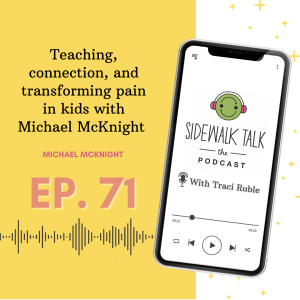
Tuesday May 25, 2021
Tuesday May 25, 2021
Michael McKnight is an educator at heart. Although he no longer teaches in the New Jersey classroom where he got his start and now has a handful of accolades and additional titles to his name, Michael is still as passionate now as he was four decades ago about connecting with students in ways that empower them to learn, not just stuff their heads with more information.
On this episode of The Sidewalk Talk podcast, Traci sits down with Michael to chat about all things education, technology in the classroom, and the research that gets Michael the most excited about the future of education. Michael specializes in working with kids who have endured adverse childhood experiences (ACEs), but although these kids have gone through more than many adults at a young age, Michael holds on to his characteristic optimism and hope that kids’ pain-based behavior can be transformed by teachers like him who put kids and connection first. During the episode, Michael even shares his advice for parents walking through a global pandemic and the subsequent disruption of the education system with their kids. Parent, teacher, student, or someone in between—don’t skip this episode with Michael McKnight!
Episode Milestones
[00:07] Intro
[02:52] Meet Michael
[07:31] The hope in transforming a kid’s pain-based behavior
[09:22] Michael’s mentors and the research that gets him excited
[13:40] Quality connection versus the obedience model in schools today
[16:07] Michael’s advice to parents: rupture and repair
[21:02] How Michael stays optimistic about educating kids
[25:47] ACE’s: adverse childhood experiences
[27:12] Technology and connection in kids and the classroom
[35:50] Michael’s word for you
[40:00] Outro
Resources Mentioned
Life Space Crisis Intervention
Unwritten: The Story of a Living System
“Resilience: The biology of stress and the science of hope”
Standout Quotes from the Episode
“Most of our most troubled kids are really kids that carry enormous amounts of pain, and that behavior that we see, we call it pain-based behavior—behaviors by kids in pain.”
—Michael McKnight
“For the most part, young people learn not so much about whatever it is they’re studying—they learn from teachers they like.”
—Michael McKnight
“Parenting is absolutely a task that is impossible to do perfectly. And I think we have to give ourselves a little bit of room there.”
—Michael McKnight
“We focus on credential-izing, we focus on content, and then we wonder why teachers are in the classroom and that’s all they do.”
—Michael McKnight
“I don’t see technology as being a specific kid problem. I think it’s an adult problem because it’s so easy to get caught up in it. It becomes an extension of self almost.”
—Michael McKnight
“This isn’t about fixing you—it’s really just about getting to know you and seeing who you are, and that dynamic affects me as much as you, maybe me more than you.”
—Michael McKnight
“At our core, we’re really feeling creatures who think. Human beings are feeling creatures who think. And we have to be able to go into emotions because they drive learning, they drive attention, they drive everything we do. And yet in many areas we’ve kind of disconnected that and kept this illusion that teaching and learning is purely an intellectual pursuit. It is not.”
—Michael McKnight
“Without that connection, many of our kids are there in body but not in mind. And our schools need to be able to shift from their current model of thinking to something much more alive and something much more whole and natural.”
—Michael McKnight
Connect:
Find | Sidewalk Talk Podcast
On Instagram: @sidewalktalkorg
On Twitter: @sidewalktalkorg
Find | Traci Ruble
On Instagram: @TraciRubleMFT
On Twitter: @TraciRubleMFT
On Facebook: @TraciRubleMFT
Find | Michael McKnight
On LinkedIn: @MichaelMcKnight
On Twitter: @mmcknight32
On Facebook: @MichaelMcKnight
SUBSCRIBE TO THIS PODCAST
On Spotify
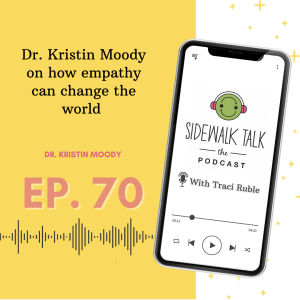
Tuesday May 18, 2021
Dr. Kristin Moody on how empathy can change the world | Dr. Kristin Moody
Tuesday May 18, 2021
Tuesday May 18, 2021
Dr. Kristin Moody started out her career as a teacher passionate about deeply connecting with her students. That connection, and her subsequent interest in the study of empathy, propelled Kristin into a career in just that—launching Empathy at Work and spending her time studying the science behind empathy and how we connect to one another.
On this episode of The Sidewalk Talk podcast, Traci talks with Kristin on all things empathy, emotional contagion, self-care and mindfulness, and Kristin’s hopes for how the world can change for the better when it comes to empathy. In a continually more divided, and digitized, society, empathy can be hard. But it’s not impossible, and Kristin is here to give us the tools necessary to practicing empathy more authentically every day.
Episode Milestones
[00:07] Intro
[02:19] Meet Dr. Kristin
[05:27] Kristin’s definitions of empathy
[11:48] The physiology behind empathy and emotional contagion
[21:55] Empathizing in a digital world
[25:35] Connecting to different types of people, self-care, and mindfulness
[30:40] Meditation
[32:35] Social media’s impact on the brain
[37:16] Kristin’s hopes for how the world can change
[42:53] Kristin’s word for you
[45:10] Outro
Resources Mentioned
The Mindfulness Coaching School
Standout Quotes from the Episode
“I am deeply called to learn from others, and that evolved into an understanding of what empathy is. Which I think is learning from and being allowed to be shaped by others in a way that we have a biology for and we have a physiology for.”
—Dr. Kristin Moody
“Empathy is a focused attention on another. The acceptance of that person’s truth without judgement. An accurate interpretation of that person’s emotional state. And then a response to that person’s state with parity.”
—Dr. Kristin Moody
“Empathy really just is about sitting in and holding space with someone and being able to share a feeling.”
—Dr. Kristin Moody
“If you have true empathy, it doesn’t have to be exhausting because it’s a choice.”
—Dr. Kristin Moody
“I can make a decision to flip the switch at any time and really listen to somebody and practice, and I can also make the decision at any time to turn it off and move through my life, to put blinders on. But that also means that sometimes you just have to go inwards and put blinders on so that you can sit down in the right situations and totally be open-hearted.”
—Dr. Kristin Moody
“There are times when you can turn it off, so that when it really matters you can turn it on.”
—Dr. Kristin Moody
“There’s just something about the idea of believing people, accepting their truth without judgement. Recognizing that their experience is different than yours or recognizing that the way that they’re experiencing something is making it different than yours.”
—Dr. Kristin Moody
Connect:
Find | Sidewalk Talk Podcast
On Instagram: @sidewalktalkorg
On Twitter: @sidewalktalkorg
Find | Traci Ruble
On Instagram: @TraciRubleMFT
On Twitter: @TraciRubleMFT
On Facebook: @TraciRubleMFT
Find | Dr. Kristin Moody
On LinkedIn: @KristinMoody
On Instagram: @empathy_at_work
SUBSCRIBE TO THIS PODCAST
On Spotify
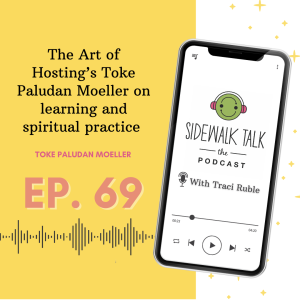
Tuesday May 11, 2021
Tuesday May 11, 2021
Toke Paludan Moeller was born a few years after World War II into a lineage of learners. His Danish ancestors include a cadre of individuals who spent their lives doing things from resisting the Nazis to being educated in the folk schools that came after their native country’s bankruptcy. Toke has made a name for himself within his family, starting the Art of Hosting and Interchange to help us all learn to live in harmony with ourselves and others.
On this episode of The Sidewalk Talk podcast, Traci gets to talk with Toke, one of her personal heroes, about the storied history that made him the person he is today, his belief that learning is a way to become a good citizen of the societies in which we live, and how to find your spiritual connection or practice and determine the work you have been called to complete in this life. This is a conversation you won’t simply listen to—you’ll feel it in your very being. Get ready for Toke to share his fount of wisdom with you.
Episode Milestones
[00:07] Intro
[03:52] Meet Toke
[24:03] Learning as a way to be a good citizen
[33:53] Finding your spiritual connection and determining the work you’re called to
[48:00] Your response to the call
[58:11] Toke’s word for you
[1:03:00] Outro
Resources Mentioned
Standout Quotes from the Episode
“Before anything else, we are human beings, and we can learn.”
—Toke Paludan Moeller
“I’m a seeker of wisdom wherever I can get it.”
—Toke Paludan Moeller
“One of the downfalls of the long-term evolution of our societies is the separation, the divorce in some places, between education and learning.”
—Toke Paludan Moeller
“We are fantastically endowed to excel in learning. And when we learn together, it’s an equalizer.”
—Toke Paludan Moeller
“We need peaceful warriorship in the world.”
—Toke Paludan Moeller
“When we are comfortable and when we are in that harmony, we are kind and so willing to give.”
—Toke Paludan Moeller
“Living in love and peace is not an old stupid hippie idea. This is how the fucking universe works.”
—Toke Paludan Moeller
“If we can live the future we want a little more every day, eventually it will be so.”
—Toke Paludan Moeller
“This is the time to remember who we are and to not be afraid of going on the most important exploration that we can do: to discover who we really are.”
—Toke Paludan Moeller
“What you practice, you will become.”
—Toke Paludan Moeller
Connect:
Find | Sidewalk Talk Podcast
On Instagram: @sidewalktalkorg
On Twitter: @sidewalktalkorg
Find | Traci Ruble
On Instagram: @TraciRubleMFT
On Twitter: @TraciRubleMFT
On Facebook: @TraciRubleMFT
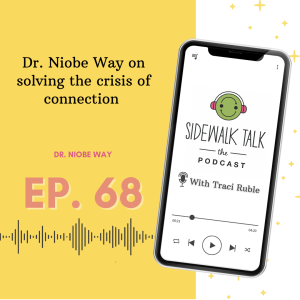
Tuesday May 04, 2021
Dr. Niobe Way on solving the crisis of connection | Dr. Niobe Way
Tuesday May 04, 2021
Tuesday May 04, 2021
For the last century or so, we’ve been told that we—humans—are the problem, not the society in which we live. What if the opposite was actually true? Dr. Niobe Way thinks so, and she’s ready to tell you why. On this episode of The Sidewalk Talk podcast, Traci sits down for a conversation with NYU professor and founder of the Project for the Advancement of our Common Humanity (PACH), Dr. Niobe Way.
Dr. Niobe founded PACH after spending years talking with students in middle school classrooms, specifically boys, about their feelings when it comes to friendship, life, and connection. Throughout their conversation, Traci and Niobe tackle the many issues embedded within our culture that work to de-humanize us, Niobe’s newest initiative—The Listening Project—and the power of transformative interviewing, and the scientific evidence pointing to the current crisis of connection we’re facing not only in the U.S., but around the world. If you’ve ever wondered if a single person determined to listen and not judge the individual sitting across from them can change the world, this is your proof that listening can in fact restore our humanity and change our culture for the better. Sit with Traci and Niobe as they engage in this heavy, yet hopeful, conversation.
Episode Milestones
[00:07] Intro
[03:07] Meet Dr. Niobe Way
[15:05] Issues in the culture that de-humanize us
[21:13] Niobe’s story on friendships between boys in the classroom
[28:45] The Listening Project and transformative interviewing
[45:37] Traci and Niobe’s dreams for disrupting the culture and addressing the crisis of connection
[48:32] The scientific evidence behind the crisis of connection
[54:59] Niobe’s word for you
[1:01] Outro
Resources Mentioned
PACH – The Project for the Advancement of our Common Humanity
The Science of Human Connection
Deep Secrets: Boys’ Friendships and the Crisis of Connection
The Crisis of Connection: Roots, Consequences, and Solutions
Standout Quotes from the Episode
“We born wanting, starving, for connection to each other. And that’s basically all we want in our lives: to be deeply connected to one another and to connect to ourselves as well.”
—Dr. Niobe Way
“We’ve created a culture that clashes with our nature.”
—Dr. Niobe Way
“We say, ‘the problem is you, not the culture in which you live.’”
—Dr. Niobe Way
“The problem is that we have created this culture that’s based on this hierarchy of humanness. It’s very critical that we stop taking the symptom and treating it as if it’s the problem, because it’s a symptom of a problem.”
—Dr. Niobe Way
“If it’s just about holding hands and being nice to each other, it’s not going to get far because we’re not disrupting the fundamental structure that creates the problem.”
—Dr. Niobe Way
“At the root of all good connection is interpersonal curiosity.”
—Dr. Niobe Way
“The question is not, ‘how do we punish that person? But, ‘how do we understand what happened so that it doesn’t happen again?’”
—Dr. Niobe Way
“Listening is not just simply about shutting up. It’s about engaging with people around their questions. Learning from someone else about the answers to your own questions. Valuing interpersonal curiosity. Seeing connection not just as connecting on social media, but actually allowing someone to be seen, and heard, and listened to.”
—Dr. Niobe Way
“We need to start from a place of humanity and who we are as humans, in order for us to get to a more just and humane place. And until we start from that place, we’re never going to get there.”
—Dr. Niobe Way
Connect:
Find | Sidewalk Talk Podcast
On Instagram: @sidewalktalkorg
On Twitter: @sidewalktalkorg
Find | Traci Ruble
On Instagram: @TraciRubleMFT
On Twitter: @TraciRubleMFT
On Facebook: @TraciRubleMFT
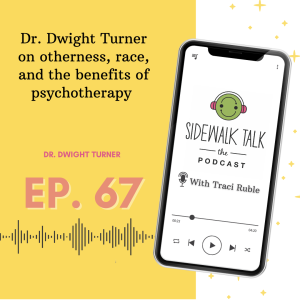
Tuesday Apr 27, 2021
Tuesday Apr 27, 2021
Dr. Dwight Turner has been studying and teaching on the concepts of otherness, race, and justice in psychotherapy long before they were trending topics in culture. He recently put out his first book on just that topic, in the hopes that readers will walk away with a better understanding of their own privilege and tendencies to otherize in culture today.
On this episode of The Sidewalk Talk podcast, Traci gets to sit down with Dr. Turner to discuss his book, the idea of creating equality and justice out of disgust, and the balance between being an individual and adapting to society, especially when it comes to the COVID-19 pandemic. This is a thought-provoking and engaging conversation between therapists, but also one that is accessible to anyone, regardless of their background in psychotherapy or counseling. Traci and Dr. Turner’s conversation ends with his wish for you, the listener, to think about what one or two things you can do within your own community to benefit the life of someone else. Don’t miss out on this important and timely conversation!
Episode Milestones
[00:07] Intro
[02:34] Meet Dr. Turner
[05:25] Dr. Turner’s book
[10:17] Aha moments in writing Intersections of Privilege and Otherness in Counselling and Psychotherapy
[13:40] Creating justice and equality out of disgust
[19:23] What Dr. Turner hopes the impact of his book will be
[26:43] The balance between being an individual and adapting to society
[36:09] Psychotherapy’s participation in other-ing
[39:58] Dr. Turner’s wish for you
[42:52] Outro
Resources Mentioned
Intersections of Privilege and Otherness in Counselling and Psychotherapy
Standout Quotes from the Episode
“Identity is formed at an early age by what we are not as well as what we are. And then our egos fight tooth and nail to maintain that sense of self.”
—Dr. Dwight Turner
“We are a far bigger creature than the one we created as a child.”
—Dr. Dwight Turner
“There’s a chance to learn something more out of difference if we can move beyond things like disgust or shame or rage that we’ve been taught.”
—Dr. Dwight Turner
“Any drive towards understanding difference, otherness, privilege, has to come from a moral and ethical and soul-like place in oneself.”
—Dr. Dwight Turner
“There’s a balancing act between duty to oneself and duty to those around you.”
—Dr. Dwight Turner
“We can’t divorce culture from family.”
—Dr. Dwight Turner
Connect:
Find | Sidewalk Talk Podcast
On Instagram: @sidewalktalkorg
On Twitter: @sidewalktalkorg
Find | Traci Ruble
On Instagram: @TraciRubleMFT
On Twitter: @TraciRubleMFT
On Facebook: @TraciRubleMFT
